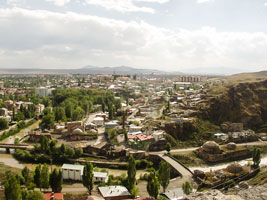Kars lies near the Armenian border, at an altitude of 1,750 meters at the foot of Kars Kalesi, the impressive citadel.
History of Kars
This Eastern Turkish city has known a turmoiled history. It was founded at the eastern side of the Kars river by the Urartians as Asteghani. For a short period (928-961) Kars became the capital of the Armenian Bagratid Kingdom. During this time the Cathedral of the Holy Apostles was built. In 1064 Kars was conquered by the Seljuk Turks under the command of Alp Arslan. Afterwards, the city was retaken by the joined Georgian-Armenian forces and was part of the Georgian Kingdom for about 300 years. In 1514 the Ottoman Turks conquered Kars and extended it with Kars Kalesi, a strong fortress as protection against the Safavid Empire. During the 19th century, Kars was often invaded by the Russians, the last time from 1878 to 1920. The Russian legacy can still be seen in much of the town's architecture.
Sights & Photos of Kars
Kars, also known as the Caucasus Gate of Eastern Anatolia, is important as a centre for trade in livestock and is also noted for its cheese. It also produces coarse woollens, carpets, and felts. Located near the formerly Soviet and nowadays Armenian border, it is an important military station and is linked by rail and road with the principal Turkish cities. The symbol of the city is, without a doubt, the citadel Kars Kalesi, it was constructed by Saltukoglu Izzeddin Han in 1152. The citadel, which was repaired many times, has two sections, the inner section, and the outer section. Only seven of the 220 towers have lasted until the present. Another historical landmark is the Church of the Holy Apostles, which is located to the south of Kars Kalesi. After having been served as a mosque for many years, the cathedral is now a museum. There are reliefs of the twelve apostles between the exterior window arches of the building.
Kars is also the setting of the novel Snow (Kar in Turkish) by the 2006 Nobel Prize winner Orhan Pamuk. In this novel, the poet Kerim Alakusoglu, conveniently named after his initials Ka, returns back home to Turkey during the 1990s after having lived for 12 years in exile. The novel deals with some of the large themes of Turkey and the Middle East: the conflict between West and East, between a secular state and Islamic government, the problems of poverty, unemployment, the veil, the army, and most of all suicide. Snow could be the most important novel in modern Turkish literature.
https://www.turkeyphotoguide.com/kars?tmpl=component&print=1#sigProId4953d59829
Travel Information and Travel Tips
The main reason to visit Kars is that it is an ideal starting point for a visit to the medieval metropolis of Ani, the ancient Armenian capital which is about 45 km away. Ani, once a major city of 100,000 inhabitants and renowned for its wealth, is one of the highlights of Eastern Anatolia.
We visited Kars and Ani during our 2003 trip through Eastern and Central Anatolia. Coming from Erzurum, it was a 4 hours bus ride, to cover the 215 km long road that winds through the evergreen forests of the mountain valleys, and finally, reaches the vast rolling steppes around Kars. We stayed at the Güngören Oteli, Halit Paşa Mahallesi, (Tel. +90 (474) 223 81 13). The rooms were really a bit off, taking a shower was sometimes quite an adventure, but the restaurant was excellent with a very friendly manager. Breakfast was served with Kars' honey and a mountain of excellent butter. Also for dining, the ocakbaşı (grill) at the restaurant was worthwhile. For a cool drink, you'll be surprised by the number of pubs.
If you want to buy postcards, a rarity in Eastern Turkey, go to the Hotel Karabağ. The reception desk sells acceptable postcards with a small label of the hotel on them.
























